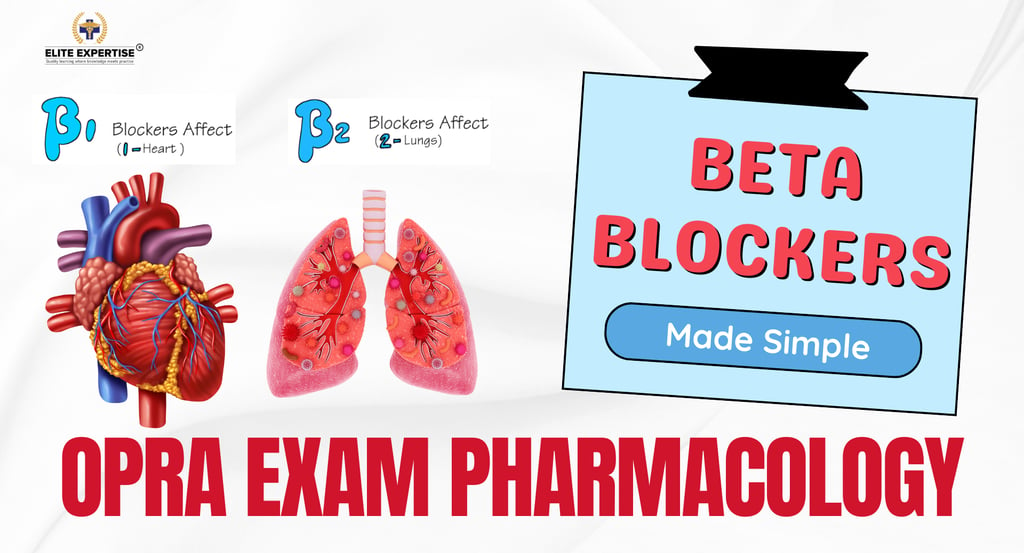ASK MY PHARMACIST | GOT QUESTIONS? Your pharmacist has answers. Click Here
Beta Blockers pharmacology A key topic in the OPRA Exam prepaparation
Beta blockers are a class of medications that reduce blood pressure and heart rate by blocking beta receptors in the heart. Learn their mechanism, types, and clinical uses for the OPRA exam.
Krupa
6/24/20253 min read
What are Beta Blockers pharmacology: A key topic in the OPRA Exam
Let’s learn about the Beta blocker pharmacology:
Beta blockers are a class of drugs every overseas pharmacist must understand who are preparing for the OPRA exam (Overseas pharmacists Readiness Assessment) . This exam is conducted by Australian Pharmacy Council (APC) for evaluating overseas trained pharmacists who are aiming to become a registered pharmacist in Australia. These medications play a central role in managing cardiovascular disorders, making them a frequently tested topic in competitive exams like OPRA. This blog topic provides details about OPRA related overview of beta blockers, including their pharmacology, clinical use and potential side effects.
What are beta-blockers?
Beta blockers, also known as beta-adrenergic antagonists, are medication that blocks the effects of epinephrine (adrenaline) on the beta receptors. They are primarily used in cardiovascular diseases to manage conditions like hypertension, arrhythmias, angina, heart failure, and post myocardial infarction care
Understanding the beta blocker
Beta -1 receptor
Primarily in heart and kidney
Increases heart rate (positive chronotropic effect)
Increases force of contraction (positive inotropic effect)
Increase renin release from kidney
Beta-2 receptor
Smooth muscles of bronchi, blood vessels etc
Bronchodilation
Vasodilation
Uterine relaxation
Glycogenolysis in liver
Beta-3 receptor
Adipose tissue
lipolysis
What is the Classification of beta blockers?
Beta blockers are categorized based on their receptor selectivity and additional properties
Non-selective beta blocker (Beta-1+beta-2)
Affect both heart and lungs
Medication should be used with caution in asthma or COPD
Examples: Propranolol, nadalol, timolol
Cardioselective beta blockers
Act mainly on heart
Safer for patients with respiratory conditions
Examples: atenolol, metoprolol, bisoprolol
Beta blockers with additional actions
With alpha-1 activity-Carvedilolo, labetalol
With intrinsic sympathomimetic activity-acebutolol, pindolol
What is the mechanism of action of beta blockers?
Beta blockers competitively inhibit beta-adrenergic receptors, leading to:
Decrease in heart rate and myocardial contractility (decreased cardiac output)
Decreases renin secretion, thus decreases secretion of angiotensin resulting in lowering of blood pressure
Decreased sympathetic stimulation of heart
This mechanism underlies their role in treating cardiovascular and other sympathetic mediated disorders, a must for the OPRA Exam.
What are the adverse effects of beta blockers?
Bradycardia
Hypotension
Fatigue or dizziness
Bronchospasm (especially in non-selective agents)
Cold extremities
Depression or vivid dreams
Masking of hypoglycemia symptoms in diabetics
What are the contraindications of beta blockers?
Asthma or severe COPD (non-selective agents)
Severe bradycardia or heart block
Uncontrolled heart failure
Hypotension
What are the common drug interactions with beta blocker?
With verapamil/diltiazem: increases the risk of bradycardia or heart block
With NSAIDs: may reduce the antihypertensive effect
Hypoglycemic against: masks the symptoms of low blood sugar
With clonidine: risk of rebound hypertension if both stopped abruptly
Watch this :
OPRA Exam Study Tips: Focus on Beta Blockers
Memorize the receptor selectivity and match with clinical indications
Understand the link between beta receptors and adverse effects
Know the therapeutic uses, especially in cardiovascular and nervous system conditions
Practice MCQs on mechanism of cation, adverse effects, and contraindications
Learn drug-specific differences
Final thoughts
Beta blockers represent a core content area in OPRA syllabus-understanding the pharmacology of the beta blockers make a significant difference in your exam performance. Master the mechanism of action, therapeutic roles, and safety profile to confidently approach related questions in OPRA exam
Ready to start your OPRA Preparation:
Join Elite Expertise, your trusted partner in pharmacist exam preparation. Our expert led OPRA coaching ensures complete coverage of clinical pharmacology topics, with structured lessons, practice tests, and personalized guidance.



Krupa Karamchand is a B. Pharm graduate and KAPS-qualified pharmacist with over 7 years of experience in the pharmaceutical field. As an experienced SEO content writer, she combines her in-depth healthcare knowledge with proven digital strategies to create informative, engaging, and search engine–optimized blogs. Krupa is passionate about making complex medical topics easy to understand and accessible to all readers.
Follow On
Krupa Karamchand
About the Author
Content Writer | Elite Expertise
Follow Us
+91 76750 84909
Privacy Policy | © 2025 Elite Expertise . All Rights Reserved.
ELITE EXPERTISE PTY. LTD (ABN: 15668292439) (ACN: 668292439)
Australian Statutory Education License: OPP 2025 ELITE EXPERTISE PTY. LTD
Disclaimer
Elite Expertise is an online education platform dedicated solely to providing coaching and preparation services for the OPRA, PEBC, PSI and PTE exams. We do not offer any sponsorship or migration services. All information provided on our platform is for educational purposes only and should not be interpreted as legal or immigration advice. For inquiries regarding sponsorship, visa applications, or migration services, please consult with licensed immigration professionals or relevant authorities.
Elite Expertise is a trusted and results-driven training platform specializing in preparation for international pharmacist licensing exams. Our comprehensive courses, expert instructors, and proven methodologies have helped countless pharmacy professionals achieve their goals and succeed in competitive regulatory exams. We are proud of our strong success rate and commitment to excellence.
Elite Expertise is an independent training provider. We are not affiliated with any global pharmacy regulatory authorities or official exam-conducting bodies.
Copyright © 2026 Elite Expertise. All rights reserved.
Address
Unit 1/73 Beverley St, Doncaster East VIC 3109, Australia


